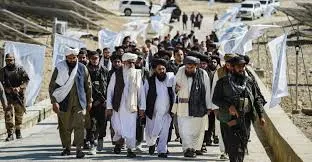
Understanding Russia’s Plan to Delist Taliban from Terror List
Russia is advancing legislation to potentially remove the Taliban from its list of designated terrorist organizations, signaling a shift towards formal recognition of Afghanistan’s current government.
The State Duma, Russia’s lower house of parliament, has approved a bill that would allow organizations to petition for removal from the banned list if they are deemed to have ceased terrorist-related activities.
The Taliban has been on Russia’s terrorist list since 2003. Despite this designation, Russia has maintained diplomatic engagements with the group, hosting Taliban delegations and referring to them as allies in combating terrorism.
President Vladimir Putin has emphasized the necessity of engaging with the Taliban to stabilize Afghanistan and address regional security concerns.
The proposed legislation requires further approval from the upper house and President Putin’s signature to become law. If enacted, it would facilitate formal diplomatic relations and potential economic cooperation between Russia and Afghanistan under Taliban rule.
This move reflects Russia’s strategic interest in reasserting influence in Central Asia and addressing security threats from Islamist groups in the region.
Internationally, the Taliban’s governance has been contentious, particularly concerning human rights issues such as restrictions on women’s education and movement.
While Russia appears poised to formalize relations with the Taliban, broader international recognition remains limited, with many countries conditioning recognition on improvements in human rights and inclusive governance.